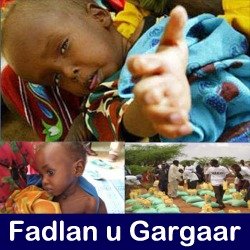The peace and reconciliation process in Somalia has entered a critical juncture. A new Constitution, drafted with the help of the United Nations Development Programme, is scheduled to be adopted in the next few weeks.
Will the new Constitution help deliver peace to a country ravaged by more than two decades of civil war? The optimism of the international community is not shared by Somalis themselves, who instead look with deep skepticism at a document that they perceive as externally-imposed, faulty and fundamentally undemocratic.
Educated Somalis Resistant To New Constitution
To understand this dynamic, one should start by questioning the facts. What is wrong with the new Somali Constitution and why is the adoption of this document met with resistance by educated Somalis, religious personalities, secularists, former Somali Prime Ministers, scholars and by all the main Somali Diaspora organizations?
International Community Imposing Federalism
First, there are issues concerning the content of the Constitution and the substance of its provisions. Above all, the question of federalism remains deeply divisive. Views can be found both in support of and against Somalia adopting a federal structure. Those against the shift to a federal state appeal to the homogeneity of Somalia’s population; the lack of resources (human and financial) which would be needed to run a federal state apparatus; the divisive potential of adding a territorial layer to an already complex situation. All in all, one crucial question remains disturbingly unanswered: why federalism? Why is the rocky road of federalism necessary and/or better placed to serve the purposes of institution-building in Somalia? Unless a convincing explanation is provided it seems impossible to discard the view, shared by many Somalis, that federalism is a means of serving foreign interests on Somali territory.
No Self-Determination For Somalis
Second, there is an issue of self-determination. Under international law, the right to self-determination gives the people of independent states the right to choose which political and economic regimes should form the very basis of their state structure. Ultimately, if federalism is to be adopted, the decision must be reached through a free expression of the will of the Somali people. Initial plans to hold a referendum to consult the Somali people on adoption of the new federal Constitution were discarded on security grounds. The document will now be voted by an 825-member Constitutional Assembly which shall, according to the transition agenda, be representative of the whole of the Somali people. Whether this is an acceptable standard under the international law on self-determination is a question which deserves further scrutiny.
Undemocratic, Inappropriate Closed Process
Third, there are wider issues concerning the process through which the new Constitution has been drafted and surrounding both the way and the timing in which it will be adopted. Somalis rightly claim that this process is undemocratic, non-transparent, non-Somali owned and inappropriate to the ends it purports to serve. Some ask ‘why’ a new constitution is to be drafted now, at a time when the Country has no elected or truly representative body to oversee the process of its formation. At the very least, this is a legitimate question. Drafting a constitution which is not the result of peace-making but which is itself a constitutive act of peace-making is a bold experiment. Can it work? Possibly, but only as long as the premises on which the document is drafted are themselves an act of peace-making, and not an exercise in the usurpation of power. This cannot be said of the process which has brought the new document into being.
Document Driven By Foreign Intervention
The new Constitution was brought to bear by a process which is affected by the very same flaws that it is supposed to address: lack of representation, divisiveness, detachment from the will of the people. Hence, is it reasonable to expect a constitution, drafted in the midst of conflict, under the lead of a desperately weak government and the heavy pressure of foreign interveners, to be successful in eliminating social distrust and lead Somalia towards representative democracy? Nation building is a complex phenomenon and its sustainability is inherent in democratic legitimation. Where its foundations are shaky, its future is at peril.
On the whole, the lack of a functioning government in Somalia is a problem both for Somalis and for the international community. The international community laments the existence of weak and ineffective political institutions and security apparatus. The Somali people, in addition, lament the inexistence of legitimate institutions to speak with their voice. The answer of the international community to their quest for legitimacy has been met with resilience. Benchmarks now, legitimacy later. The threat of sanctions against ‘potential spoilers’ aiming to obstruct the peace process has thus given teeth to an inherently flawed constitution-making process.
In Somalia, the international community in assisting with constitution-making seems to have, once again, crossed the fine ‘Mogadishu line’ which separates assistance from interference. What comes next is a gamble: will the process of transition deliver? And if so, at what cost for the sovereignty and political independence of Somalia?
It is understandable that Somalis look at the new Constitution with scepticism and disenchantment. The process which brought this document into being falls short of international standards on self-determination and the rule of law. The answers to why adopting a new, federal constitution in a matter of weeks should be a step forward towards building peace in Somalia seem to be convincing for foreign actors but have failed to prove convincing for Somalis themselves. The question of legitimacy, therefore, is an open one. The question of effectiveness, on the other hand, is what shall be watched closely in the years to come.
Mohamed Ali Hassan is Chairman of the Somali-American Peace Council
Manuela Melandri is a PhD candidate at University College London
Op-Ed Contributor: First published at http://newsblaze.com/story/20120609174842zzzz.nb/topstory.html






































comment closed after 30 days / Jawaabaha waa la xiray ama waa la joojiyay wixii ka badan 30 cisho.